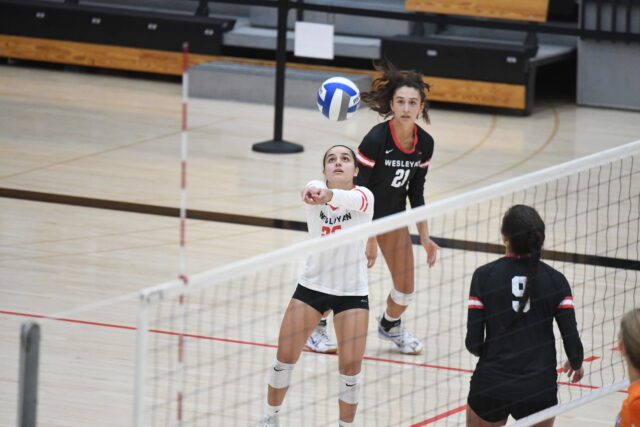Fifty Years After Title IX, Wesleyan’s Women Student-Athletes Push Forward

A little after 6 p.m. last Tuesday, the din of pre-game practice shots and tinny hip-hop quieted inside Silloway Gymnasium, and Wesleyan’s women’s volleyball team assembled for the season opener against the Coast Guard Bears. Within moments of the first serve, the scoreboard registered the Cardinals’ lead: 5-0, a fitting start to a game that the No. 21 nationally ranked team ultimately won three sets to none.
But it was also an accidental symbol: On the 50th anniversary of the passage of Title IX of the Education Amendments—the landmark civil rights law perhaps best known for expanding women’s opportunities to play scholastic sports—the fall 2022 athletics season began with strong showings from Wesleyan’s women student-athletes. The following evening, the No. 4 nationally ranked women’s soccer team—coming off a record-setting 18-win season and its first appearance in the Final Four—beat Worcester Polytechnic Institute 2-0 in its season opener on Smith Field, the second home game on the sports calendar. (As of Monday, both teams were undefeated in the start to the season.)
The recent successes of Wesleyan’s women’s teams owe partly to the progress toward greater gender equity that began with Title IX. “When you start to really even out the playing field between men’s sports and women’s sports, this is the fruit of that labor,” said Eva Meredith, head coach of women’s soccer since 2004. “We’re seeing these women getting the same opportunities and the same resources . . . We’ve taken huge strides here at Wesleyan in the last few years to make sure that [student-athletes] have the same athletic experience, whether you’re on a men’s or a women’s team.”
Ben Somera, head coach for women’s volleyball, said that by giving more athletes a chance to play and compete, the trickle-down effects of Title IX have helped raise the caliber of his players. “The opportunities that have been created around volleyball have been significant,” Somera said. “Right now, it’s one of the most-played sports by high school girls, and the talent you’re seeing in our gym is a clear reflection of how that [Title IX] movement has created those playing experiences for them.”
Women’s volleyball entered 2022 with five straight winning seasons, the most recent of which included victories in two NCAA Tournament matches and an appearance in the Regional Final round of the national tournament. After snapping Coast Guard’s five-game win streak last week—the Cardinals’ third consecutive victory in a season opener—Somera said it’s realistic to aim for a national championship this year. “I really believe we’re one of the best teams in the country,” Somera said, “and over the course of the year we’re going to play some of the other best teams in the country.”
In reflecting on 50 years of Title IX, Somera noted how the values instilled through college sports—leadership, teamwork, camaraderie—have become something of an intergenerational gift. “I think, as more and more women find opportunities, they’re going to pass on the benefits that males have really enjoyed for over 100 years,” he said.

In women’s soccer against WPI, the Cardinals’ possession and pressure opened a door for Grace Devanny ’23—last year’s NESCAC Player of the Year and the program’s first-ever All-American—to tally a goal and an assist in the second half. The victory follows a standout 2021, during which the Cardinals registered the most wins in a single season and made it to the national semifinals in their first-ever NCAA Tournament appearance. With eight starters from last year returning to the pitch, Meredith said the challenge now is navigating the high hopes for a repeat—or even an appearance in the finals—while enjoying the journey and the process along the way. “If we do that, I know we have talent enough to have another great season,” said Meredith, voted NESCAC Coach of the Year in 2021.
Meredith, who considers herself part of the “second wave” of post-Title IX women’s sports, said it’s essential to educate players on the pioneers and trailblazers.
“I was provided opportunities as a player because of Title IX . . . For our players today, we need to make them aware and understand where their opportunities came from—the Wesleyan alum who played in their jersey number before them, who paved the way and fought for them—so we don’t take for granted the opportunity to play competitive sports at a high level.”
(Maxx McNall, Wesleyan’s director of sports information, contributed to this report.)

